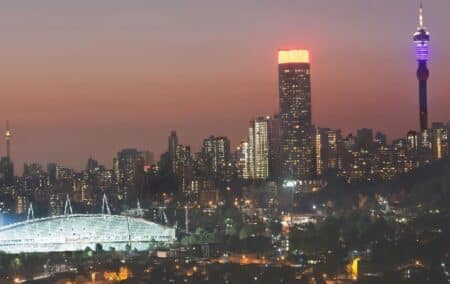Mmusi Maimane, head of the One South Africa (OSA) movement and erstwhile leader of the Democratic Alliance (DA), confirmed this weekend that he would be running for president. This was ahead of the official launch of his party – what Maimane was calling a ‘platform’ – in Soweto this weekend.
Songezo Zibi, former editor of Business Day and founder of the Rivonia Circle, also recently said that he would be running for president, as did former chief justice, Mogoeng Mogoeng.
It almost seems that more people are planning on running for President in 2024 than those who do the annual Comrades Marathon. But in South Africa a person cannot actually run for President. What a person can do – and this is why Maimane is now creating a political platform – is be elected to Parliament as a representative of a party.
South Africa’s system of government is a parliamentary one, not a presidential one. This means that South African voters do not elect the President, this is the task of the 400 MPs who are elected every five years to (in theory) represent the interests of South Africans.
However, some have begun suggesting that South Africans should elect the President directly, rather than leaving this to our MPs. A proposal from the Zondo Commission suggested that if the President was directly elected, the destructive tenure of Jacob Zuma would not have been possible, something which I and others think is unlikely.
And it is not a simple task to simply decide to elect the President directly. South Africa is a parliamentary democracy, not a presidential one. Oversight of the chief executive of the state should be done by Parliament, and in democracies less dysfunctional than ours, this is the case. But if we decided that the President should be elected directly we would need to do a complete overhaul of the structure of government. It simply does not make sense to directly elect the chief executive in a parliamentary system. Israel experimented with direct election of the prime minister some twenty years ago, but abandoned the experiment after only three elections, as the inherent incompatibility of directly electing the head of government in a parliamentary system became apparent.
However, what South Africa should perhaps consider is separating the role of head of state from that of head of government. Many countries around the world do so, with a president acting as a ceremonial figurehead, with a prime minister (or chancellor as the position is known in Germany, or Taoiseach as it is known in the Republic of Ireland) as the head of government. South Africa itself did this when it initially became a republic in 1961, with a ceremonial president serving alongside an executive prime minister until 1984, when the roles of president and prime minister were combined.
‘Does not rule’
The role of a ceremonial president was well captured by Bhimrao Ambedkar, who helped draft India’s post-independence constitution. He said of the position: ‘the President occupies the same position as the King under the English Constitution. He is the head of the State but not of the Executive. He represents the Nation but does not rule the Nation. He is the symbol of the Nation. His place in the administration is that of a ceremonial device on a seal by which the nation’s decisions are made known.’
In Germany the president is similarly ‘above’ politics, with the individuals in the position generally resigning their party membership for the duration of their term as President.
Splitting the role of President of this country into that of a ceremonial president and executive prime minister would certainly not be a silver bullet to the problems that South Africa faces, but would lift the head of state above the fray of party politics. A ceremonial president would embody the state and represent all its people and their values and aspirations, while allowing a prime minister to get their hands dirty in the messy business of governing and party politics.
However, South Africans shouldn’t completely jettison the idea of directly electing (at least some of) our leaders.
Cities are increasingly becoming more important political and economic units, as the world continues to urbanise. In many cases large cities are more influential and have greater economic output than countries. For example, the GDP of Johannesburg is greater than that of each of our neighbouring countries, and its economic output is probably bigger than that of all of our neighbours combined.
Key driver
There is a growing school of thought that cities need directly elected mayors in order to reach their potential. The United Kingdom has been a key driver of this, with many of its major urban areas, including London, directly electing a mayor, rather than relying on a city council (effectively a parliamentary type of arrangement) to govern.
Some of the advantages of directly electing a mayor is that it can break the hold of traditional parties on city government, allow for the creation of a long-term strategy for a city, give the city a ‘face’ in dealing with other levels of government and investors, and increase the public’s interest in city management and governance.
Again, this is not a silver bullet to the problems of South Africa’s cities, but it’s time to start thinking about doing things differently. The way we have been doing it hasn’t worked, whether in our cities or nationally.
It’s not only time to think outside the box but perhaps we need to get a brand new container.
[Image: https://www.joburg.org.za/about_/Pages/About%20the%20City/About%20Joburg/Facts-about-Joburg.aspx]
If you like what you have just read, support the Daily Friend


